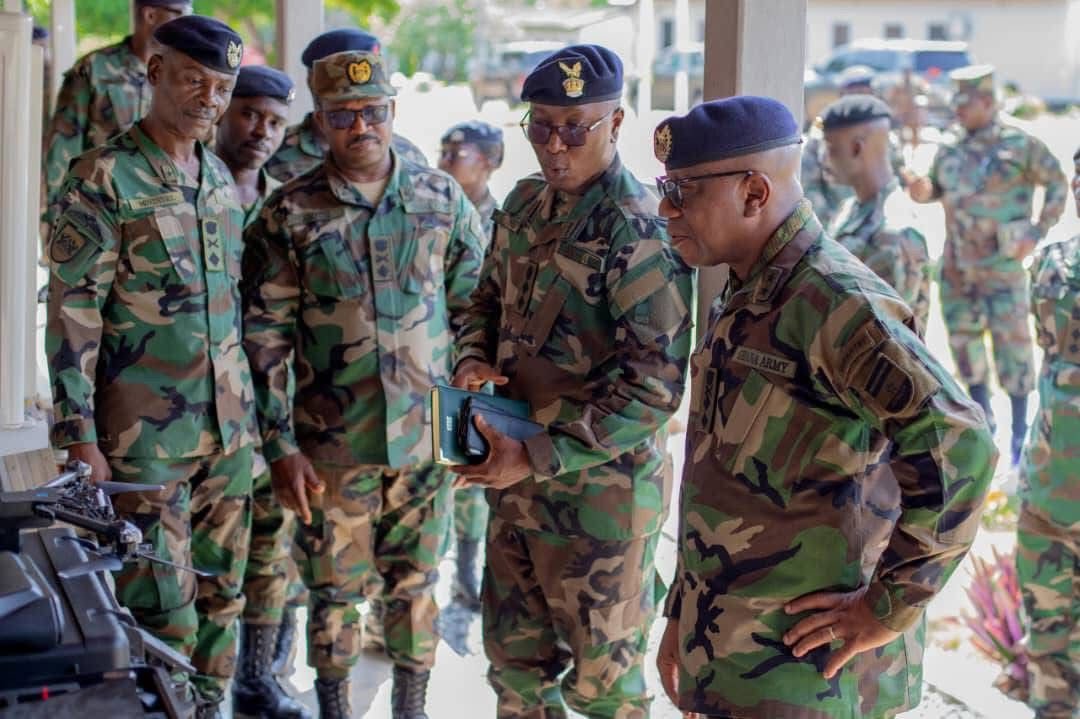News
We should find a governance system that unites us, not divides us – Oscar Provencal

Ghanaian actor, Oscar Provencal has called on duty bearers to work towards a governance system that unites rather than divides the nation.
Speaking in an interview with GBC News in the wake of the recent military helicopter crash that claimed the lives of government officials, military personnel, and party executives, Mr. Provencal praised President John Dramani Mahama and his team for the smooth organisation of the state funeral.
He commended the organisers for their swift work within a short period and also described the decision to give the victims a military burial as a good call, noting that the military handled the ceremony professionally.
While acknowledging the good work done, he pointed out inefficiencies in the system, particularly in the initial handling of the crash site.
He said poor management of such sites could compromise forensic investigations, which are crucial in finding out the causes of such accidents.
Mr. Provencal expressed concern over the public’s rush to accident scenes to take pictures and videos, especially in the age of social media, where such content goes viral within seconds.
He urged the public to delete disturbing footage and praised responsible media outlets for their coverage.
However, he urged journalists to reflect on their reporting, stressing the need for sensitivity towards grieving families and capacity building in media practices.
He added that tragedy, which led to the demise of eight gallant men as well as the road accident that killed 15 people should serve as a wake-up call to fix weaknesses in the system.
Mr. Provencal stressed that unity should not only come from tragedy, adding that Ghanaians must live in peace, free from hatred and bitterness, regardless of political, religious, or ethnic differences.
“At the end of the day, politics should not divide us but unite us,” he stressed.
By: Jacob Aggrey
Hot!
Is the “Rev” title biblical?

In many Ghanaian churches, pastors are often introduced as “Reverend” or simply “Rev.”
The title is seen as a mark of respect, yet its biblical basis continues to stir debate.
While some Christians argue that it is a harmless way to honour church leaders, others insist it is unbiblical and should not be used at all.
Those who question the title usually point to the Bible itself. Nowhere in Scripture did Jesus or the apostles use “Reverend” for themselves or for one another.
Instead, they addressed each other as “brother” or “servant.” In Matthew 23, Jesus even warned his followers not to seek titles such as “rabbi” or “father,” teaching that all believers are equal under one God.
Critics also note that Psalm 111:9 describes God’s name alone as “holy and reverend” in the King James Bible.
To them, this means the word should be reserved for God, not for human beings. Others go further, citing Job 32, which cautions against giving flattering titles to men.
For such voices, the modern use of “Reverend” risks elevating pastors beyond what the Bible prescribes.
On the other hand, defenders of the title argue that it is not meant to replace God’s reverence but simply to acknowledge a minister’s role.
In many churches, “Reverend” is given to ordained ministers who have undergone training, much like the way a doctor is addressed as “Dr.”
The Bible itself, they point out, encourages believers to honour their leaders, with 1 Timothy 5:17 stating that elders who direct the affairs of the church well are “worthy of double honour.”
In this sense, the title is seen as a formal courtesy rather than a theological statement.
Supporters remind critics that Christianity does not operate in a vacuum but within cultural settings.
In Ghanaian society, respect for elders and authority is central to social order. Just as chiefs are addressed with titles such as “Nana” or “Togbe,” many Christians believe it is fitting to extend a similar courtesy to church leaders.
In their view, calling a pastor “Reverend” reflects Ghanaian values of honour and respect, and does not amount to worshipping a human being.
Yet the debate is far from settled. Some argue that the title has been abused, with individuals presenting themselves as “Reverend” without any proper training or accountability.
Calls have even been made for the regulation of church titles to prevent confusion and protect the credibility of ministry. Others, however, see no harm in its continued use, so long as it is not taken beyond what Scripture allows.
At the heart of the matter lies a bigger question: should Christians stick strictly to biblical language when addressing their leaders, or is it acceptable to adapt titles as society evolves?
The conversation is not just theological but cultural, touching on how Ghana balances respect for tradition with the authority of Scripture.
The debate over the “Rev” title is therefore not one with easy answers. What is clear, however, is that it forces us to reflect on how we show honour, how we interpret the Bible, and how faith interacts with our cultural practices.
As the discussion continues in church pews and on social platforms, we ask you: should pastors and ministers be called “Reverend,” or should Christians abandon the title altogether?
By: Jacob Aggrey
News
Brigadier General Michael Opoku not under arrest – GAF confirms

The Ghana Armed Forces (GAF) has denied reports claiming that Brigadier General Michael Opoku has been arrested by security operatives for possessing ammunition.
In a statement issued on Tuesday, August 19, 2025, and signed by Captain V.A. Arhin, Acting Director General of Public Relations, GAF said enquiries from various security agencies and national investigation authorities had not confirmed the alleged arrest.
The statement explained that Brigadier General Michael Opoku remains an active member of the Ghana Armed Forces and is not under arrest for any crime.
GAF further assured the public that any military officer found to have committed a crime would face the same legal procedures as any other citizen.
It added that the report of his arrest was false and should be ignored, urging the public to desist from spreading misinformation and disinformation.
By: Jacob Aggrey














